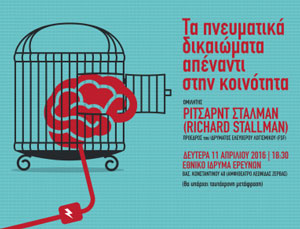Nicos Poulantzas Institute and transform! europe are co-hosting the event on 11 April with Richard Stallman, President of the Free Software Foundation (FSF), as keynote speaker.
Monday, April 11, 2016, 18.30 (EET)
The copyright emergence coincides historically with that of the printing press. It was designed in a way that responds to the needs arisen after the printing machine invention and the mass copies reproduction. However, copyright does not meet the new conditions created in the era of the digital networks, a fact that is revealed by the severity of copyright infringement legislation. The multinational companies that base their profitability on the copyright proceed to form lobbies which exert great pressure demanding the expansion of the breadth of the powers as well as draconian penalties to protect their interests. This results in the restriction of citizens’ free access in technology.
Dr. Richard Stallman argues that if we really want to serve the technological development for the benefit of our community, then we should move forward to institutional changes in multiple directions. Under this principle, the Free Software movement arose in 1983. The next year the development of the GNU software (www.gnu.org) began. This free software provides each user with the freedom to copy and distribute it with or without modification. Today, GNU/Linux system (GNU software includes Linux) is used by millions of computers users, but most importantly this software inspired and enabled –technically and organizationally- the expansion of P2P (peer 2 peer) projects.
In 1985 R. Stallman founded the Free Software Foundation in order to spread the idea of freedom in the use of computers and support legally and also practically the rights of the users. In 1989 the first version of the GNU General Public License-GPL was completed and the freedoms of users were established. Meanwhile, the so-called copyleft clause (unlike copyright which guarantees the right of the intellectual property) requires these freedoms to maintain in all the copies. These developments are considered as a breakthrough for the legal culture and the digital commons protection.
[Simultaneous interpretation provided]
